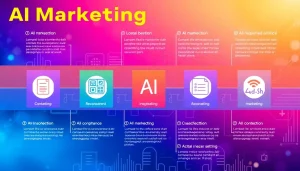Introduction to AI Marketing Tools
In today’s fast-paced digital landscape, businesses are continually seeking innovative solutions to stay ahead of the competition. One of the most effective pathways to achieving this is through the use of AI marketing tools. These advanced technologies not only streamline marketing processes but also enhance the effectiveness of campaigns, enabling brands to reach their target audiences with precision. In this article, we will explore the various dimensions of AI marketing tools, examine their key features, and delve into the leading tools for 2025.
What Are AI Marketing Tools?
AI marketing tools refer to software solutions that use artificial intelligence technologies to automate and optimize marketing tasks. These tools can analyze consumer behavior, generate insights, and even create content, all with minimal human intervention. By leveraging algorithms and machine learning, they allow marketers to make data-driven decisions that improve campaign outcomes and ROI (Return on Investment).
The Importance of AI in Modern Marketing
The role of AI in marketing has become increasingly pivotal in recent years due to its potential to transform how businesses operate. By automating routine tasks and analyzing vast datasets, AI enables marketers to focus on strategy and creativity. As more consumers engage with brands through digital channels, the ability to personalize interactions and deliver timely, relevant content is essential. AI technologies empower marketers to achieve this, enhancing customer satisfaction and loyalty while driving growth.
Overview of AI Marketing Tool Categories
AI marketing tools can be categorized into several key segments, each tailored to address specific marketing challenges and objectives:
- Content Generation Tools: These tools automate the creation of written content, graphics, and videos.
- Predictive Analytics Platforms: They analyze historical data to forecast future trends and customer behavior.
- Social Media Management Tools: These tools help automate posting, engagement, and analysis across social media platforms.
- Customer Relationship Management (CRM): AI-enhanced CRMs help manage customer interactions and data throughout the customer lifecycle.
Key Features of Effective AI Marketing Tools
Automation and Efficiency
One of the foremost benefits of AI marketing tools is their ability to automate repetitive tasks, such as data entry, report generation, and even customer communication. By incorporating automated workflows, businesses can significantly reduce the time spent on these tasks, freeing up valuable resources for creative and strategic efforts. For instance, tools like HubSpot offer automation capabilities that streamline lead nurturing processes, improving sales funnel efficiency.
Data Analysis and Insights
Data is the backbone of effective marketing, and AI excels in analyzing complex datasets to derive actionable insights. AI marketing tools can sift through mountains of data to identify patterns, segment audiences, and evaluate campaign performance. By providing real-time analytics, businesses can quickly pivot their strategies and optimize ongoing campaigns, ensuring they remain aligned with customer preferences and behaviors.
Personalization and Customer Engagement
With the rise of consumer expectations for personalized experiences, AI marketing tools enable brands to tailor their messaging and offers to individual preferences. By leveraging machine learning algorithms, these tools analyze customer data to predict what content is most likely to resonate with each user. This level of personalization has been shown to improve engagement rates, conversion rates, and overall customer satisfaction.
Top AI Marketing Tools in 2025
Leading Tools for Content Generation
Content is king in the digital marketing realm, and AI tools have emerged as vital allies in this space. Here are some of the leading content generation tools you might consider for 2025:
- Jasper: This AI writing assistant helps marketers create high-quality content quickly, catering to different formats such as blogs, social media posts, and ad copy.
- Copy.ai: Known for its ease of use, Copy.ai generates marketing copies from simple prompts, saving time while maintaining creativity and originality.
- Writesonic: With various templates and AI capabilities, Writesonic enhances marketers’ ability to produce compelling content efficiently.
Predictive Analytics Platforms
Predictive analytics is a game-changer for proactive marketing strategies. Tools like Google Analytics and IBM Watson Marketing enable marketers to forecast future trends by analyzing past behavior patterns. These tools provide insights into customer segments, helping businesses focus their efforts on the most lucrative opportunities.
Best AI Tools for Social Media Management
Social media has become an indispensable marketing channel, and AI tools are critical for managing these platforms effectively. Some notable options include:
- Buffer: Buffer allows marketers to schedule posts, analyze social media performance, and engage with audiences seamlessly.
- Hootsuite: This comprehensive platform offers insightful analytics and scheduling capabilities, enabling successful social strategy and execution.
- Later: Focused on visual content, Later assists brands in planning and scheduling Instagram posts effectively, based on analytics.
How to Choose the Right AI Marketing Tool for Your Business
Assessing Your Marketing Needs
Before selecting an AI marketing tool, it is crucial to assess your specific marketing needs. Consider factors such as your target audience, the type of content you need to produce, and the marketing channels you focus on. An in-depth understanding of your current challenges and goals will aid in selecting the tool that aligns best with your business objectives.
Budget Considerations
AI marketing tools come with varying price points, ranging from free versions to premium subscriptions. It’s essential to establish a budget that allows for a quality investment in these tools while also considering the potential ROI. Analyze the tool’s features in relation to its cost and determine if it provides long-term value.
Integration with Existing Systems
Seamless integration is vital for maximizing the benefits of AI marketing tools. Make sure that any tool you consider can integrate smoothly with your existing marketing technologies and processes. This will enhance the tool’s utility and help maintain continuity across your marketing efforts.
Best Practices for Implementing AI Marketing Tools
Creating an AI-Driven Marketing Strategy
Implementing AI marketing tools effectively requires a strategic approach. Start by defining clear objectives and KPIs that the tool will help achieve. Incorporate AI insights into your marketing strategy, using data to inform decisions about content, target audience, and campaign execution.
Monitoring Performance and KPIs
Regularly monitor the performance of your AI marketing tools to ensure they are delivering the desired results. Analyze metrics such as engagement rates, conversion rates, and overall ROI. This ongoing assessment will help you refine your marketing strategies and adjust your tool usage for optimal performance.
Continuous Learning and Adaptation
The marketing landscape is constantly evolving, especially with the rapid advancements in AI technology. Stay informed about new features, updates, and best practices regarding the tools you employ. Encourage your marketing team to engage in ongoing training and adapt to changes to maintain a competitive edge.
Conclusion
As businesses continue to navigate the intricacies of digital marketing, AI marketing tools will remain integral to achieving success. By understanding their functionalities, features, and best practices, marketers can harness these innovations to enhance efficiency, drive engagement, and ultimately grow their brands. Embracing AI marketing tools is not just a trend; it’s a strategic imperative for staying ahead in an increasingly competitive environment.








